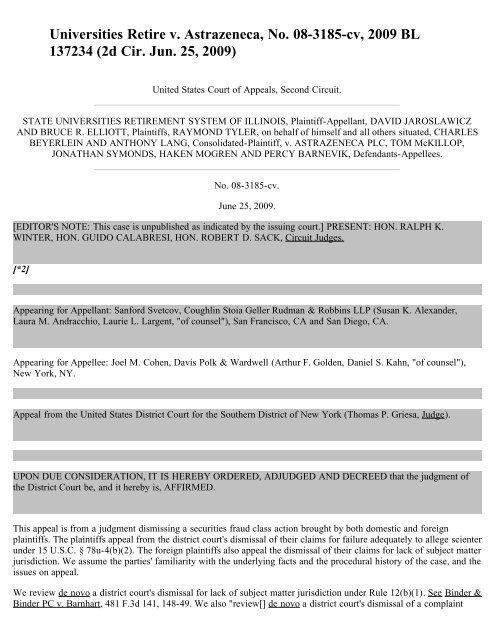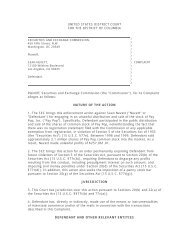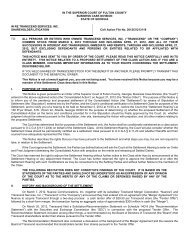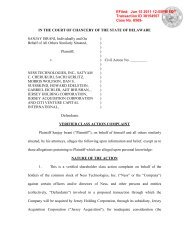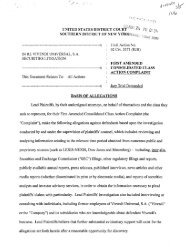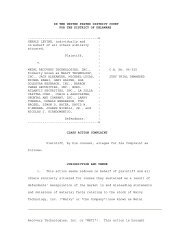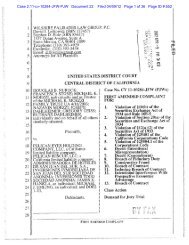Universities Retire v. Astrazeneca, No. 08-3185-cv, 2009 BL 137234 ...
Universities Retire v. Astrazeneca, No. 08-3185-cv, 2009 BL 137234 ...
Universities Retire v. Astrazeneca, No. 08-3185-cv, 2009 BL 137234 ...
Create successful ePaper yourself
Turn your PDF publications into a flip-book with our unique Google optimized e-Paper software.
<strong>Universities</strong> <strong>Retire</strong> v. <strong>Astrazeneca</strong>, <strong>No</strong>. <strong>08</strong>-<strong>3185</strong>-<strong>cv</strong>, <strong>2009</strong> <strong>BL</strong><br />
<strong>137234</strong> (2d Cir. Jun. 25, <strong>2009</strong>)<br />
United States Court of Appeals, Second Circuit.<br />
STATE UNIVERSITIES RETIREMENT SYSTEM OF ILLINOIS, Plaintiff-Appellant, DAVID JAROSLAWICZ<br />
AND BRUCE R. ELLIOTT, Plaintiffs, RAYMOND TYLER, on behalf of himself and all others situated, CHARLES<br />
BEYERLEIN AND ANTHONY LANG, Consolidated-Plaintiff, v. ASTRAZENECA PLC, TOM McKILLOP,<br />
JONATHAN SYMONDS, HAKEN MOGREN AND PERCY BARNEVIK, Defendants-Appellees.<br />
<strong>No</strong>. <strong>08</strong>-<strong>3185</strong>-<strong>cv</strong>.<br />
June 25, <strong>2009</strong>.<br />
[EDITOR'S NOTE: This case is unpublished as indicated by the issuing court.] PRESENT: HON. RALPH K.<br />
WINTER, HON. GUIDO CALABRESI, HON. ROBERT D. SACK, Circuit Judges.<br />
[*2]<br />
Appearing for Appellant: Sanford Svetcov, Coughlin Stoia Geller Rudman & Robbins LLP (Susan K. Alexander,<br />
Laura M. Andracchio, Laurie L. Largent, "of counsel"), San Francisco, CA and San Diego, CA.<br />
Appearing for Appellee: Joel M. Cohen, Davis Polk & Wardwell (Arthur F. Golden, Daniel S. Kahn, "of counsel"),<br />
New York, NY.<br />
Appeal from the United States District Court for the Southern District of New York (Thomas P. Griesa, Judge).<br />
UPON DUE CONSIDERATION, IT IS HEREBY ORDERED, ADJUDGED AND DECREED that the judgment of<br />
the District Court be, and it hereby is, AFFIRMED.<br />
This appeal is from a judgment dismissing a securities fraud class action brought by both domestic and foreign<br />
plaintiffs. The plaintiffs appeal from the district court's dismissal of their claims for failure adequately to allege scienter<br />
under 15 U.S.C. § 78u-4(b)(2). The foreign plaintiffs also appeal the dismissal of their claims for lack of subject matter<br />
jurisdiction. We assume the parties' familiarity with the underlying facts and the procedural history of the case, and the<br />
issues on appeal.<br />
We review de novo a district court's dismissal for lack of subject matter jurisdiction under Rule 12(b)(1). See Binder &<br />
Binder PC v. Barnhart, 481 F.3d 141, 148-49. We also "review[] de novo a district court's dismissal of a complaint
pursuant to Rule 12(b)(6)." Rombach v. Chang, 355 F.3d 164, 169 (2d Cir. 2004). In considering a Rule 12(b)(6)<br />
motion to dismiss a complaint brought under section 10(b) of the Securities Exchange Act of 1934, 15 U.S.C. § 78j(b),<br />
we "accept all factual allegations in the complaint as true," and "consider the complaint in its entirety, as well as other<br />
sources courts ordinarily examine when ruling on Rule 12(b)(6) motions to dismiss, in particular, documents<br />
incorporated into the complaint by reference, and matters of which a court may take judicial notice." Tellabs, Inc. v.<br />
Makor Issues & Rights, Ltd., 551 U.S. 3<strong>08</strong>, ___, 127 S. Ct. 2499, 2509 (2007); see also Cortec Indus., Inc. v. Sum<br />
Holding L.P., 949 F.2d 42, 48 (2d Cir. 1991) (on a 12(b)(6) motion to dismiss, a court may consider documents when<br />
"there was undisputed notice to plaintiffs of their contents and they were integral to plaintiffs' claim"). Moreover, "in<br />
determining whether the pleaded facts give rise to a `strong' inference of scienter, the court must take into account<br />
plausible opposing inferences." Tellabs, 127 S. Ct. at 2509. [*3]<br />
Whether or not the district court had and we have subject matter jurisdiction over the foreign plaintiffs' claims, we<br />
must evaluate the merits of the case before us so as to address the appeal brought by the domestic plaintiffs. We begin<br />
with this inquiry.<br />
"To state a cause of action under [Securities and Exchange] Rule 10b-5, [17 C.F.R. § 240.10b,] a plaintiff must plead<br />
that in connection with the purchase or sale of securities, the defendant, acting with scienter, made a false material<br />
representation or omitted to disclose material information and that plaintiff's reliance on defendant's action caused<br />
[plaintiff] injury." In re Time Warner Inc. Securities Litigation, 9 F.3d 259, 264 (2d Cir. 1993) (internal quotation<br />
marks omitted). "A complaint will survive [a Rule 12(b)(6) motion to dismiss] only if a reasonable person would deem<br />
the inference of scienter cogent and at least as compelling as any opposing inference one could draw from the facts<br />
alleged." Tellabs,, 551 U.S. at ___, 127 S. Ct. at 2509-10.<br />
In order to satisfy the requirement to plead "with particularity facts giving rise to a strong inference that the defendant<br />
acted with [scienter]," a plaintiff may either "alleg[e] facts (1) showing that the defendants had both motive and<br />
opportunity to commit the fraud or (2) constituting strong circumstantial evidence of conscious misbehavior or<br />
recklessness." ATSI Communications, Inc. v. Shaar Fund, Ltd., 493 F.3d 87, 99 (2d Cir. 2007). It is unclear whether<br />
the plaintiffs mean to reassert the motive-and-opportunity theory of scienter that was rejected by the district court. In<br />
any event, we find this theory unpersuasive for the reasons stated by that court. See In re AstraZeneca Securities<br />
Litigation, 559 F. Supp. 2d 453, 468-69 (S.D.N.Y. 20<strong>08</strong>).<br />
We also agree with the district court's thorough analysis of the "conscious misbehavior or recklessness" theory of<br />
scienter. See id. at 469-72. "To survive dismissal under the `conscious misbehavior' theory, the appellants must show<br />
that they alleged reckless conduct by the appellees, which is at the least, conduct which is highly unreasonable and<br />
which represents an extreme departure from the standards of ordinary care to the extent that the danger was either<br />
known to the defendant or so obvious that the defendant must have been aware of it." In re Carter-Wallace Inc.,<br />
Securities Litigation, 220 F.3d 36, 39 (2d Cir. 2000) (internal quotation marks omitted). The complaint here makes no<br />
such allegations. To the contrary, we agree with the district court that the "[p]laintiffs have not alleged anything to<br />
negate the idea that defendants were attempting to develop a drug they thought [on the whole to be] beneficial and<br />
were so describing it [*4]<br />
to the public." In re AstraZeneca, 559 F. Supp. 2d at 471. While the evidence gathered during the class period did<br />
suggest certain risks associated with the drug, the defendants' public statements identified these concerns. We do not<br />
agree with the plaintiffs that the defendants were required to inform the public every time a participant in a study died,<br />
or even every time a death appeared perhaps to be related to the drug. "Drug companies need not disclose isolated<br />
reports of illnesses suffered by users of their drugs until those reports provide statistically significant evidence that the<br />
ill effects may be caused by — rather than randomly associated with — use of the drugs and are sufficiently serious<br />
and frequent to affect future earnings." In re Carter-Wallace, Inc. Securities Litigation, 150 F.3d 153, 157 (2d Cir.<br />
1998). Once all of the data about the deaths had been revealed, analysts such as Deutsche Bank and Citigroup still<br />
expected FDA approval, with Citigroup stating that the risk-benefit profile remained favorable. It was therefore not<br />
unreasonable for the defendants to have interpreted the data in the same way. We conclude that the plaintiffs have not<br />
alleged any facts that would give rise to a finding of conscious misbehavior or recklessness on the part of the<br />
defendants. The district court therefore properly dismissed the claims of the domestic plaintiffs.
The claims advanced by the foreign plaintiffs are identical to the claims advanced by the domestic plaintiffs. Because<br />
we have addressed and rejected these claims on the merits in connection with the claims made by the domestic<br />
plaintiffs, over which we unquestionably have subject matter jurisdiction, "the jurisdictional question [regarding our<br />
subject matter jurisdiction over the foreign plaintiffs] could have no effect on the outcome," and we can decline to<br />
address it without raising concern that "the pretermission of the jurisdictional question [is being used] as a device for<br />
reaching a question of law that otherwise would have gone unaddressed." Steel Co. v. Citizens for a Better<br />
Environment, 523 U.S. 83, 98 (1998). We therefore need not and do not reach the question of our subject-matter<br />
jurisdiction over the foreign plaintiffs' claims.<br />
For the foregoing reasons, the judgment of the District Court is hereby AFFIRMED. [*1]<br />
B<strong>BL</strong>S DD X1B9CTS003


